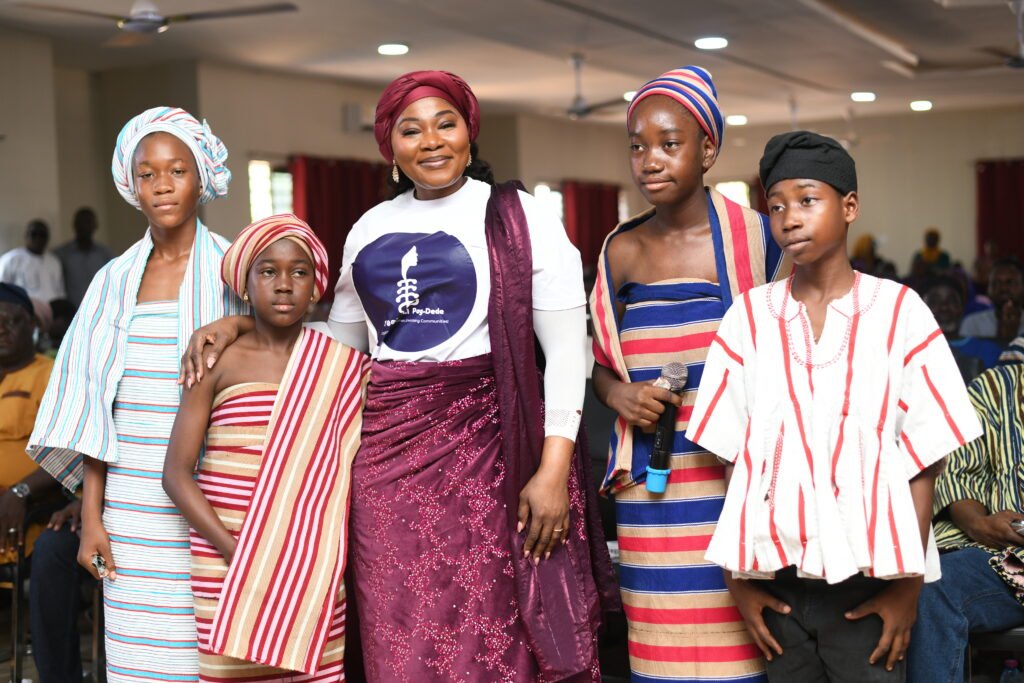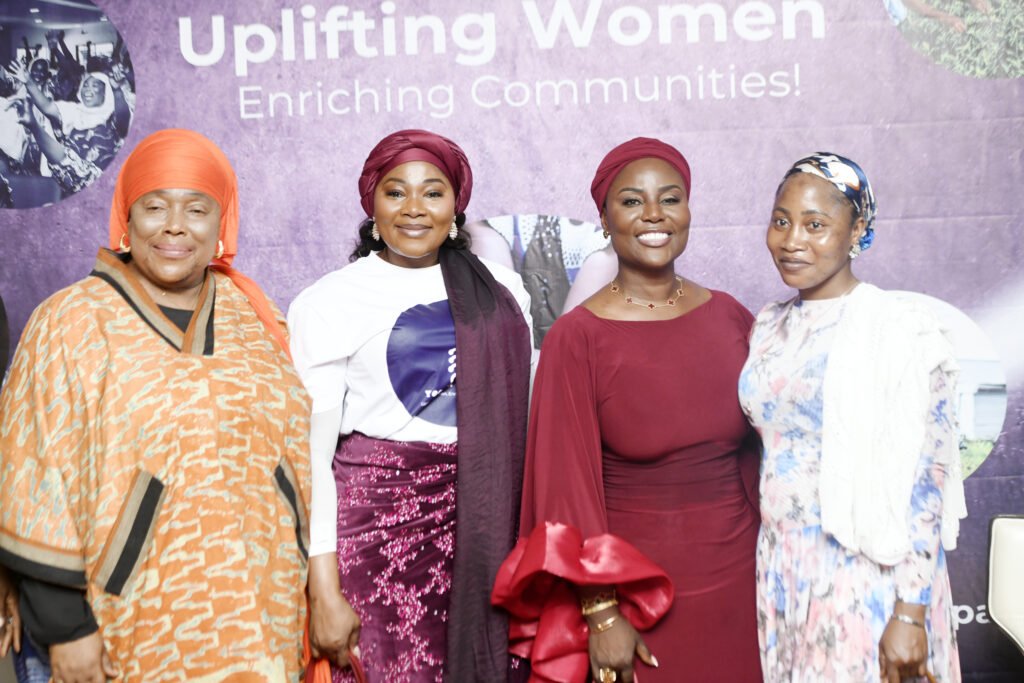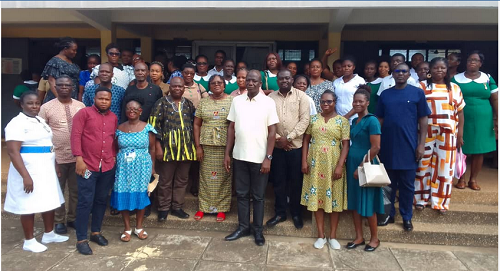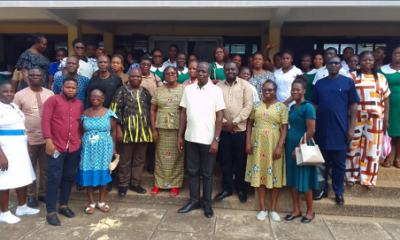News
Six foods that can trigger allergies – Dr. Kofi Brifo

The Founder of the Skin Foundation Africa, Dr. Kofi Brifo, has outlined six common foods that can cause and trigger allergic reactions.
They include milk, nuts, eggs, wheat, seafood such as shrimps and lobsters, and soy products like soy milk.
Speaking on the topic “Allergies and the Skin: What to Know” on GBC’s Breakfast Show, Dr. Brifo explained that allergies occur when the body’s immune system overreacts to a harmless substance.
He said this can lead to inflammation, itching, redness, skin rashes, and in severe cases, breathing difficulties.
According to him, allergies are very common in urban African communities, affecting about 30 to 40 percent of people.
He added that reactions can be caused by environmental factors such as detergents, perfumes, skincare products, insect bites, and foods.
Dr. Brifo noted that food remains one of the leading causes of allergic reactions and highlighted six major triggers.
These are cow milk, nuts, eggs, wheat, seafood such as shrimps and lobsters, and soy products.
He stressed that while some people may have individual triggers like pineapples, these six foods are the most common culprits, especially in children.
On treatment, Dr. Brifo cautioned the public against the misuse of steroid creams for rashes, particularly in children, warning that this could lead to harmful side effects such as stretch marks at an early age.
He explained that allergies cannot be completely cured but can be managed through awareness, avoidance of triggers, and gradual desensitisation methods.
Dr. Brifo urged the public to take allergic reactions seriously, especially when symptoms go beyond rashes and include difficulty in breathing, describing such cases as life-threatening emergencies.
By: Jacob Aggrey
News
Beyond NPP, NDC: 2 ‘Gen Z’ MPs unite to prioritise purpose over politics

In a rare display of cross-party collaboration, two Members of Parliament from opposing political traditions have set aside partisan differences to champion a shared cause—empowering women and transforming communities.



On February 14 (Valentine’s Day), the Savelugu Community Centre hosted the official launch of the Yooyili Pag-Dede Foundation, an initiative designed to expand economic opportunities for women, strengthen early childhood education, nurture youth creativity, and improve access to clean water.
Leading the effort was Abdul Aziz Fatahiya, Member of Parliament for Savelugu (New Patriotic Party), who was joined in solidarity by Dorcas Affo-Toffey, Member of Parliament for Jomoro and Deputy Minister for Transport.
The partnership has drawn attention not only for its development focus but also for its symbolism—a bipartisan alliance centered on people-first leadership.
In her address, Fatahiya emphasised that while the people of Savelugu were hardworking and resilient, many women and young people lack structured opportunities to maximise their potential.
“Our women are determined, but determination alone is not enough. We must build systems that give them access to resources, skills, and markets,” she stated.
She explained that the Yooyili Pag-Dede Foundation will operate through five core programmes, including potable drinking water.
The foundation also seeks to promote financial independence for women and ensure the inclusion of persons with disabilities in community development efforts.
Key initiatives include:
- She Grows: supporting women farmers with training and modern agricultural initiatives.
- Style of Dagbon: a hub for women’s fashion entrepreneurship and creative enterprise.
- Story Weavers of Yooyili: empowering children aged six to 15 as storytellers, artists, and cultural ambassadors.
- Dagbon Karizung: strengthening pre-school education across Dagbon communities.
- Clean Water Project: expanding access to safe and potable water.
Delivering the keynote address, Mohammed Amin Adam, the Member of Parliament for Karaga and former Finance Minister, underscored the central role of education in breaking the cycle of poverty.
He urged parents to prioritise investment in their children’s future and commended Madam Fatahiya for the initiative, supporting it with a donation of GH¢20,000.
Madam Affo-Toffey praised the project, describing it as a commendable initiative worthy of emulation, particularly by female MPs across the country. With an initial GH¢20,000 donation, she noted that the initiative had inspired her to explore similar development models within her own constituency.
Prior to launching the foundation, Madam Fatahiya organised a free breast cancer and chronic disease screening programme that benefited more than 3,000 women across Savelugu.
She described the foundation as an extension of that commitment, aimed at addressing systemic barriers to women’s advancement through practical and sustainable solutions.
In a lighthearted moment that drew laughter and applause, Madam Fatahiya referred to herself and her colleague as “the Gen Z MPs.”
“WE may belong to different political parties, but today we are the Gen Z MPs that collaborate, innovate, and we don’t wait,” she remarked.
She added that a new generation of women political leaders are willing to bridge divides in pursuit of measurable impact.
Also present at the launch was Habib Iddrisu, Member of Parliament for Tolon, who noted that the initiative signals a shift toward issue-based governance to one that prioritises development outcomes.
The event attracted several dignitaries from both political parties, including the Northern Regional Chairman of the NPP, as well as former MCEs and DCEs.
In an era frequently characterised by political polarisation, the bipartisan cooperation witnessed in Savelugu offers a compelling alternative narrative, when leaders unite around shared values and community needs, transformation becomes possible.
From: Geoffrey Buta, Savelugu
Join our WhatsApp Channel now!
https://whatsapp.com/channel/0029VbBElzjInlqHhl1aTU27

News
Teenage pregnancy cases rise in Akatsi South, exceeds national target

THE Akatsi South Municipality recorded 314 teenage pregnancies in 2025, exceeding the national target despite intensified efforts by health officials to curb the situation.
“Sad as it may be, six girls aged 10–14 years were pregnant, and 269 teenagers delivered, of which five were between 10–14 years, all making up 12.1 per cent against the national target of reducing below 11.5 per cent,” Miss Justine Sefakor Alornyo, Municipal Director of Health Services, disclosed during the 2025 health performance review at the Akatsi South Municipal Assembly Hall.
Under Antenatal Care (ANC), 2,594 pregnant women were registered in 2025, representing 65.9 per cent coverage, up from 2,278 in 2024 with 58.4 per cent coverage.
The Municipality recorded 2,071 supervised deliveries in 2025, a slight increase from 1,997 in 2024. All 2,071 newborns received BCG, Penta, and Measles-Rubella vaccines.
Miss Alornyo attributed the gains to continuous education and advocacy across the Municipality.
On HIV, 151 cases were identified—108 females and 43 males. All are on treatment, including 15 pregnant women who tested positive. Eighteen exposed babies have been placed on prophylaxis.
She added that 60 tuberculosis cases were managed, while investigations into six suspected measles cases, two yellow fever cases, and one Acute Flaccid Paralysis (AFP) case all tested negative.
Highlighting achievements, Miss Alornyo thanked stakeholders, especially the Municipal Assembly, for supporting service delivery. In 2025, the construction of CHPS compounds at Zuta, Ahlepedo, and Asafotsi, as well as the renovation of the Wute Health Centre, is ongoing.
Midwives were posted to Wuxor, Gui, Dzogadze, Akuave, and Livega CHPS facilities, while Dzogadze and Gui CHPS were officially handed over for service delivery.
The annual review assessed progress, achievements, gaps, and innovative strategies to address health challenges.
Akatsi South Municipality is served by 40 health facilities: two hospitals (one private and one municipal), six health centres, 27 CHPS compounds, one CHAG facility, and four clinics.
Infrastructure deficits and transportation challenges remain key concerns.
—GNA
Join our WhatsApp Channel now!
https://whatsapp.com/channel/0029VbBElzjInlqHhl1aTU27















